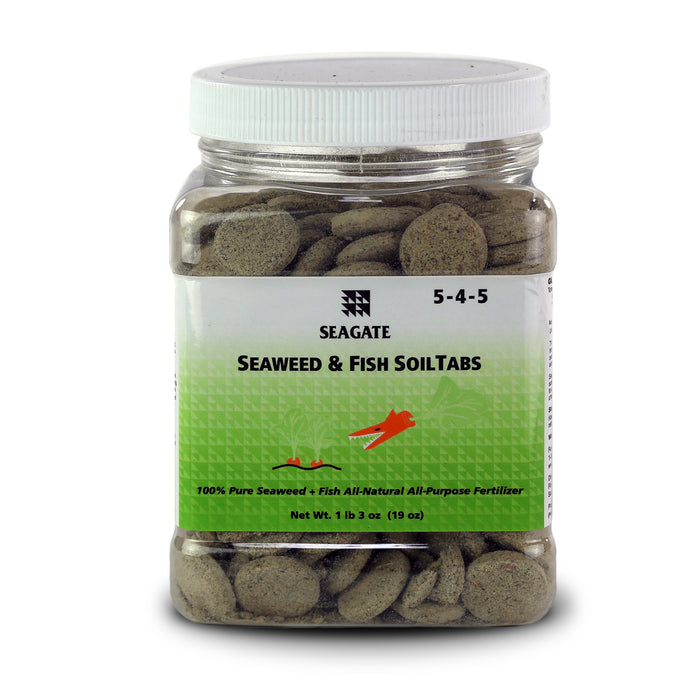
Seaweed & Fish SoilTabs
Description
Source: Seagate Seaweed & Fish SoilTabs 5-4-5 combines two of nature’s best natural sources of nutrients in one easy-to-apply tablet. This fertilizer is composed of dehydrated sardines and dehydrated seaweed (Giant Kelp - Macrocystis pyrifera). The seaweed is harvested by hand by Seagate’s contract divers. The sardines are captured by local purse-seine vessels. The 1 lb. 3 ounces of tablets in each container were derived from 8 lbs. of raw fish plus seaweed.
Application: Use 1-2 tablets per quart of soil. More is okay as there is no danger of over-fertilizing and burning the roots.
Convenience: There are approx. 275 tablets +/- per container. For existing houseplants or garden vegetables and flowers, these tablets are easily applied. Just press each tablet into the soil around the roots of each plant. The slow-release tablets will continue to fertilize for 2-4 months, depending upon local conditions and water-saturation of the soil. (Soils that are very moist will tend to decompose and consume the tablets more quickly.) This is a very economical way to fertilize hundreds of plants from the tablets in one container of fertilizer.
Composition: Unlike most fertilizers that are derived from chemicals, usually petroleum-based compounds, these SoilTabs feed your plant real food.
Seagate SoilTabs 5-4-5 (N-P-K) level of nitrogen-potassium-potash is ideal for the flowering stage of plant growth.
Seagate Fish Fertilizer Concentrate 11-5-1 is the recommended fertilizer during the plant’s vegetative growth stage.
Benefits: Plants that are grown with fish and seaweed rather than chemical fertilizers will be healthier, stronger and more disease-resistant. By pressing the tablets below the soil around the roots, SoilTabs will allow you to fertilize houseplants with fish without the smell. Should you wish to add more tablets to a plant, there is no danger of over-fertilizing and burning the roots.
Economical: One container can fertilize hundreds of plants.
(Note: These containers are sold on the basis of net weight, not tablet count. On average, there will be about 275 tablets per container. However, variations in density due to compression and humidity in our tableting machinery can cause lighter or heavier tablets which will change the tablet count.)

